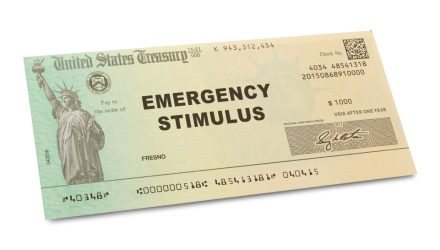The long-anticipated stimulus package that Wall Street and Main Street were both hoping to shore up the economy was finally struck ahead of Wednesday’s trading session. Will the massive $2 trillion stimulus package be enough to prop up U.S. equities for the foreseeable future or will it fade along with the extended bull market?
“At last, we have a deal,” Senate Majority Leader Mitch McConnell said from the Senate floor after the deal was struck early Wednesday. “After days of intense discussions, the Senate has reached a bipartisan agreement on a historic relief package for this pandemic,” McConnell said.
Some key provisions of the stimulus package include the following:
- Income support via payments to Americans based on their income levels. Per a Financial Times report, this includes “$1,200 per adult, or $2,400 per couple, with additional payments for children. The payments will be phased out starting at annual incomes of $75,000 per person, or $150,000 per couple, so the wealthiest families would not see any benefit.”
- Business bailouts for industries hit hard by the coronavirus outbreak, including $25bn for passenger airlines, $4bn for cargo airlines and $17bn for companies that are “critical to maintaining national security.”
- To help shore up employment, the stimulus also offers increased unemployment benefits by $600 a week for a total of four months.
- Hospital funding that includes $150bn for protective equipment for healthcare workers, testing supplies, increased workforce and training, and new construction to house patients afflicted with coronavirus.
- For small businesses, the stimulus package provides $367bn in loans and grants to companies with less than 500 employees
“Elected leaders have now followed the Federal Reserve into ‘whatever it takes’ mode,” said Mark Hamrick, senior economic analyst for Bankrate. “In the days and weeks ahead, economic data will enumerate the devastating financial toll of the crisis threatening lives and livelihoods. Helping to mitigate that impact … should provide a much-needed inoculation of hope for Americans.”
A Relative Play in U.S. Equities Strength
If the equities market can resume its trajectory before the coronavirus outbreak, this creates an opportunity for investors to capitalize on the Direxion FTSE Russell US Over International ETF (NYSEArca: RWUI). RWUI offers investors the ability to benefit not only from domestic U.S. markets potentially performing well but from their outperformance compared to international markets.
- Seeks investment results, before fees and expenses, that track the Russell 1000®/FTSE All-World ex-US 150/50 Net Spread Index (the “index”).
- The fund, under normal circumstances, invests at least 80% of its net assets (plus borrowing for investment purposes) in securities that comprise the Long Component of the index or shares of ETFs on the Long Component of the index.
- The index measures the performance of a portfolio that has 150% long exposure to the Russell 1000® Index (the “Long Component”) and 50% short exposure to the FTSE All-World ex-US Index (the “Short Component”).
For more relative market trends, visit our Relative Value Channel.

